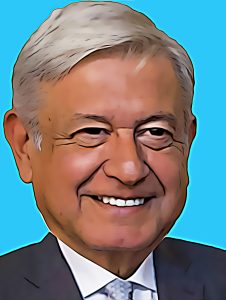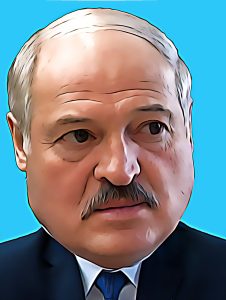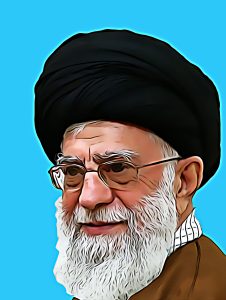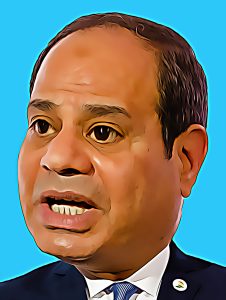1 Dec 2022 | Mexico, Tyrant of the Year 2022
 “He who has nothing to hide, has nothing to fear”. These were the words uttered by the Mexican president, Andrés Manuel López Obrador in a February 2022 press conference held the day after Heber López Vásquez, founder and director of the digital news outlets NoticiasWeb and RCP Noticias, was shot and killed. However this was not a call for greater transparency and action to respond to the ever-climbing rate of journalist murders in Mexico. He was publishing what he alleged were the confidential financial details of leading journalist, Carlos Loret de Mola, in response to the journalist’s reporting.
“He who has nothing to hide, has nothing to fear”. These were the words uttered by the Mexican president, Andrés Manuel López Obrador in a February 2022 press conference held the day after Heber López Vásquez, founder and director of the digital news outlets NoticiasWeb and RCP Noticias, was shot and killed. However this was not a call for greater transparency and action to respond to the ever-climbing rate of journalist murders in Mexico. He was publishing what he alleged were the confidential financial details of leading journalist, Carlos Loret de Mola, in response to the journalist’s reporting.
“This act of intimidation and the abuse of the presidential office would be egregious in any circumstance. However In Mexico, against a backdrop of rampant impunity and one of the worst track records for the safety of journalists, it is far worse than that,” says Index’s policy and campaigns officer Nik Williams. “According to the Committee to Protect Journalists, 151 journalists and press workers have been killed in Mexico since 1992. The causes of these murders are complex; but a messy tangle of narco-politics, organised crime, corrupt police and state officials and runaway impunity has made Mexico one of the most dangerous locations to be a journalist outside a warzone. In fact, so far in 2022, Mexico is second only to Ukraine for the number of journalists killed.
Since Obrador only came to power in 2018, it would be overly-simplistic to lay this solely at his feet. However, according to Article 19, attacks on the press have increased by 85% since he took power, with every single Mexican state witnessing such incidents for the first time in 2021.
When there is a culture of impunity and the devaluing of journalists, the scene is set for violence. It is this erosion of the civic fabric that makes Article 19’s director for Mexico and Central America: “His [Obrador’s] speech causes other political actors to replicate his attacks. These actors feel empowered and allowed to attack in the face of a narrative that presents the press as an adversary. We are in a war speech, where the enemy must be annihilated.”
After publicly leaking Carlos Loret de Mola’s alleged salary and potentially violating Article 16 of the Mexican Constitution in the process, Obrador labelled journalists who are critical of him as “thugs, mercenaries, sellouts” and “the real mafia.” This framing establishes a false and dangerous parallel between the free press and criminal enterprises, further emboldening threats that can soon escalate to violence.
Impunity, the like of which is found in Mexico, requires significant and proactive action to address. It is not something that will just right itself when no one is looking. It requires a commitment to the value of free expression. It requires action. According to Human Rights Watch, “[o]f the 105 investigations into killings of journalists conducted by the federal Special Prosecutor for Crimes Against Freedom of Expression (Feadle), since its creation in 2010, just six have led to homicide convictions.” What good is a dedicated prosecutor if the rate of convictions is so low? Not only is this a failure to the family, friends and colleagues of the murdered journalists whose killings are being investigated by Feadle, this is a signal to those seeking to silence critical reporting: you can continue uninterrupted and undisturbed. This weakening of the mechanisms by which journalists can be protected is also seen in the 2020 decision of the Mexican Congress and supported by Obrador, to eliminate the independent funding that supported the Federal Mechanism for the Protection of Human Rights Defenders and Journalists. Now the mechanism is dependent on the Interior Ministry to pay for protection measures, but funds have been consistently cut. Leading media freedom organisations and 14 members of US Congress have raised concerns about this, seemingly to no avail.
Williams says: “What Obrador sees as a war against the elites, we see as a war against journalists, and ultimately free expression. Without Obrador stepping forward and addressing the ingrained climate of fear and impunity, instead of fixating on those who report on uncomfortable facts, Mexican journalists will remain stuck in the crosshairs of those seeking their silence.”
1 Dec 2022 | Belarus, Tyrant of the Year 2022
 “You can usually tell the quality of a tyrant’s credentials by the number of people he has thrown in jail on spurious grounds and Europe’s last dictator, Alyanksandr Lukashenka, is no exception,” says Index associate editor Mark Frary.
“You can usually tell the quality of a tyrant’s credentials by the number of people he has thrown in jail on spurious grounds and Europe’s last dictator, Alyanksandr Lukashenka, is no exception,” says Index associate editor Mark Frary.
Lukashenka started his fifth term as president in August 2020, following an election that most credible observers believe was neither fair nor free.
According to the human rights organisation Viasna, the list of political prisoners has now grown to 1,442 people. “This includes our former Index colleague Andrei Aliaksandrau and his wife Irina Zlobina, who were sentenced to 14 years and nine years respectively in early October for ‘establishing an extremist formation’,” says Frary.
It seems that even the slightest hint of opposition to Lukashenka can see you head off to the country’s infamous prisons. In November, 69-year-old teacher Ema Stsepulyonak was given a two-year sentence for supposedly insulting the Belarusian leader following a police shoot-out at a Minsk apartment that left two people dead.
Lukashenka is clearly worried by such “extremists”. His government has started a growing list of people who are considered as such and anyone appearing on it are not allowed to hold public office, teach, publish writing or participate in military service. On one day at the end of October, Lukashenka’s regime added a frankly ridiculous 625 extremists to the list. “Belarus must be so dangerous with this many extremists, right?” asks Inna Kavalionak of Politzek.me in the winter 2022 edition of Index on Censorship magazine.
“Lukashenka’s fate is closely tied with that of his friend and neighbour Vladimir Putin,” says Frary. “In the illegal war in Ukraine, Lukashenka has allowed Belarus to be used as a launchpad for Russia’s soldiers into the country’s northern flank. He has also promised that ‘Europe will tremble’ if Belarus is attacked.”
By aligning himself with Putin, Lukashenka is firmly planting himself on the wrong side of history.
1 Dec 2022 | Iran, Tyrant of the Year 2022
 If you were in the Iranian capital Tehran on Friday 23 September, you would be forgiven for thinking that Ali Khamenei was a popular and misunderstood leader. That day, thousands of Iranians marched through the city waving Iranian flags and holding high photos of Khamenei and his predecessor Ayatollah Ruhollah Khomeini.
If you were in the Iranian capital Tehran on Friday 23 September, you would be forgiven for thinking that Ali Khamenei was a popular and misunderstood leader. That day, thousands of Iranians marched through the city waving Iranian flags and holding high photos of Khamenei and his predecessor Ayatollah Ruhollah Khomeini.
“This is a classic from the authoritarian playbook,” says Index’s associate editor Mark Frary. “How often do you see such pro-government rallies in truly free countries? You have to wonder what pressure they bring to bear on the people present to agree to take part in events which are clearly designed to drown out true protests.”
The September rallies were a largely unsuccessful attempt, at least outside Iran, to distract attention from widespread protests in the country following the death in custody of 22-year-old Mahsa Amini, detained by Iran’s notorious Gasht-e Ershad.
“These so-called ‘morality police’ uphold respect for Islamic morals, including detaining women who they see as being improperly dressed, such as wearing revealing or tight-fitting clothing or not wearing the required hijab,” says Frary.
Since then the country has been wracked by protests, which have been violently subdued. Oslo-based NGO Iran Human Rights say that a minimum of 448 people, including 60 children, have been killed in the protests. Many of those paying the ultimate price for protest have been women.
The Iranian authorities have been trying to keep a lid on the news by shutting down the internet in the country. Iran’s parliament has also been working on a draft bill that seeks to impose further restrictions on internet access for people in Iran, including criminalising the use of virtual private networks.
1 Dec 2022 | Egypt, Tyrant of the Year 2022
 While world leaders met in Sharm el-Sheikh for COP27, British-Egyptian pro-democracy activist and writer Alaa Abd el-Fattah began a full hunger strike. He is imprisoned for “spreading false news” and has been denied access to diplomatic and legal counsel.
While world leaders met in Sharm el-Sheikh for COP27, British-Egyptian pro-democracy activist and writer Alaa Abd el-Fattah began a full hunger strike. He is imprisoned for “spreading false news” and has been denied access to diplomatic and legal counsel.
Sadly, Alaa’s case is far from unique. In fact, Human Rights First estimates that there are up to 65,000 political prisoners in detention in Egypt, though the real figure is unknown. Perplexingly, the Egyptian President Abdel Fatah el-Sisi has alleged that Egypt does not hold any political prisoners at all.
News that el-Sisi ordered the release of hundreds of prisoners in 2022 ahead of COP27 has been met with caution. “It might be tempting to think that positive change is on the horizon in Egypt following the releases of political prisoners.” says Index on Censorship’s Emma Sandvik Ling. “However, former political prisoners report continued intimidations and warnings of rearrest should they speak out against el-Sisi’s government. There is an important distinction to be made here between optics and genuine efforts to protect human rights.”
Abdel Fattah el-Sisi, who became Egyptian president after a coup in 2013, has shown increasingly authoritarian tendencies over the last decade. Among other things, el-Sisi has argued that freedom of expression “stops” when it offends Islam and urged opposition movements to “look and listen” before they speak.
Dissidents fighting for civic rights, democracy and transparency face intimidation, threats and arbitrary detentions. Alaa Abd el-Fattah’s case represents the heartbreaking reality for thousands of political prisoners in el-Sisi’s Egypt. El-Sisi is a tyrant in the true meaning of the word and his rule has a detrimental impact on freedom of expression.
 “He who has nothing to hide, has nothing to fear”. These were the words uttered by the Mexican president, Andrés Manuel López Obrador in a February 2022 press conference held the day after Heber López Vásquez, founder and director of the digital news outlets NoticiasWeb and RCP Noticias, was shot and killed. However this was not a call for greater transparency and action to respond to the ever-climbing rate of journalist murders in Mexico. He was publishing what he alleged were the confidential financial details of leading journalist, Carlos Loret de Mola, in response to the journalist’s reporting.
“He who has nothing to hide, has nothing to fear”. These were the words uttered by the Mexican president, Andrés Manuel López Obrador in a February 2022 press conference held the day after Heber López Vásquez, founder and director of the digital news outlets NoticiasWeb and RCP Noticias, was shot and killed. However this was not a call for greater transparency and action to respond to the ever-climbing rate of journalist murders in Mexico. He was publishing what he alleged were the confidential financial details of leading journalist, Carlos Loret de Mola, in response to the journalist’s reporting.


